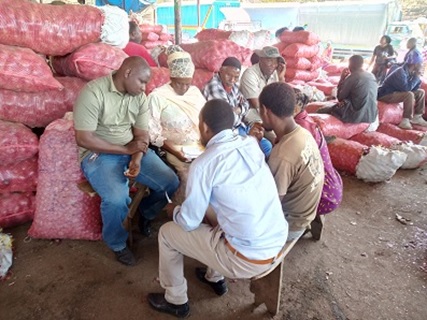
The agriculture sector in Tanzania is a key industry that accounts for 28% of GDP and generates approximately 65% of employment. The Ministry of Agriculture is promoting “agriculture as a business” and placing emphasis on improving the incomes of small-scale farmers, particularly through the enhancement of extension services.
This project is Phase 2 of the “Project for Strengthening DADP Planning and Implementation Capacity through Use of SHEP Approach in Tanzania,” which piloted SHEP (Smallholder Empowerment and Promotion) in Tanzania for approximately six years from 2019 to 2024. In Phase 1, the horticulture income of smallholders in the 12 target districts increased by 45% to 69%, demonstrating the effectiveness of “agricultural production as a business based on market survey” in the country. Phase 2 supports the Tanzanian government’s activities to build the foundation for expanding SHEP as a regular extension service to all districts across the country. The project aims for “normalization” of SHEP as an extension service by the government even after the end of this project.
Output 1: Dissemination of the SHEP approach is institutionalized and is carried out within the mandate of extension officer.
Output 2: Capacity of District Facilitation Team (DFT) to disseminate SHEP approach through DADPs is strengthened in LGAs in the Project Site.
Output 3: Upscaling SHEP dissemination collaborating with stakeholders, Development partners and private sectors.

The increased demand and interests on safe food and value-added food in ASEAN states have been driven by middle-income households due to the economic growth of ASEAN. However, an inappropriate redistribution of profit and vulnerable food value chains (FVC) remain the major constraints to improve livelihood of traditional farmers below poverty lines. Agriculture is one of the important sectors both for employment opportunities and source of income and also for food and nutrition security. Therefore, the improvement of FVC must be one of the prioritized issues to solve.
ASEAN Ministerial Meeting on Agriculture and Forestry (AMAF) and Japan International Cooperation Agency (JICA) have initiated its discussion on the concept of “the ASEAN-JICA Food Value Chain (FVC) Development Project” in February 2018. The project considers supporting the high quality, safe FVC development for trade and joint corporation with public-private sectors. The project concepts had been discussed and approved at the Senior Officials Meeting of the ASEAN AMAF Plus Three on August 29, 2018, and subsequently, confirmed at the Eighteenth Meeting of The ASEAN Ministers on Agriculture and Forestry Plus Three on October 12, 2018.
The main objective of the project is to develop quality and secure intra and extra Export-oriented FVCs in the ASEAN Region. The specific objectives include; 1) strengthening of ASEAN Good Agricultural Practice (ASEAN-GAP), 2) strengthening of Sanitary and Phytosanitary (SPS) measures, and 3) promoting public-private partnerships for the development of regional food cluster models.